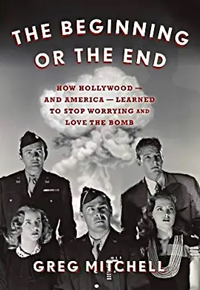Reprinted with permission from Greg Mitchell’s newsletter Oppenheimer: From Hiroshima to Hollywood.
Strong response to this new bloggy newsletter and my various articles and media appearances in past week or so has been gratifying, especially since it has drawn attention to key issues surrounding nuclear dangers that I have been raising since, oh, 1982. Among other things, there’s been a run on my book “Atomic Cover-up,” whose story really launched my nuclear obsession that year. I also enjoyed Will Bunch at the Philadelphia Inquirer hailing me as “pioneering rock journalist.” Now that is another story…
I’m also getting Oppenheimer-related “tips,” including this one (although I had to dig up the footage) from BookLockdown over at the Site Formerly Known as Twitter. I complained here yesterday, and in previous posts and an article, that while Christopher Nolan briefly shows Oppenheimer in a screening room watching film from post-bomb Hiroshima, he only covers his facial reaction, not the footage. Not even a glimpse. It’s a critical omission in the movie; Nolan could have shot it a number of ways that would have been powerful and not overwhelmingly graphic.




